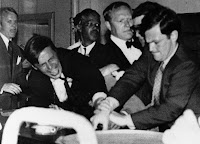Paper Lion was written by George Plimpton, a journalist, writer and actor who happened to bean ardent sports fan. It describes his experience at the Detroit Lions summer training camp in 1963 to which he went,undercover, as their “last-string” quarterback. This escapade was the second phase in what would become a career-long experiment for Plimpton in seeing how an average person would fare in the world of professional sports. His first foray into the world of professional sports was as a baseball pitcher in a Major League All-Star Game; that adventure resulted in the book Out of My League. He would go on to train as a goalie for the Boston Bruins and play on the PGA Tour—writing books about each experience. While on assignment for Sports Illustrated, he even sparred with boxing legends Archie Moore and Sugar Ray Robinson.
Other than his toe-dips in the sporting ocean, Plimpton led a very full and interesting life. Raised by educated and accomplished parents with colorful family histories, George had a rich primary education and attended Harvard University, where he wrote for the Harvard Lampoon. His college education was interrupted by service in the U.S. Army, but he graduated from Harvard in 1950 and went on to earn a master’s from King’s College at Cambridge University in England. He was the first editor-in-chief of the The Paris Review, a highly regarded literary journal. Plimpton’s literary c.v.included works on a wide variety of topics and his works chronicling his sporting exploits are credited with advancing “participatory journalism.” George Plimpton passed away in 2003 at the age of 76, the victim of an apparent heart attack.
 |
| A cartoon from The New Yorker with the caption: "Wait a minute! How do I know you're not George Plimpton?" |
There is an interesting historical footnote to George’s life: while at Harvard, he was a classmate of Robert Kennedy, and the two became very good friends (there is a scene in Paper Lion when Plimpton recounts his attendance at a Kennedy party). When Robert Kennedy was assassinated in 1968 after his victory in the California Democratic primary, it was Plimpton, with former decathlete Rafer Johnson, who helped apprehend Sirhan Sirhan as he attempted to flee the scene.
But back to Paper Lion…
 |
| Plimpton, center, making his way through the rope grid |
Though he intended to be completely incognito to the Detroit players(the coaches were aware of his status as an undercover journalist), George’scover was blown shortly into camp when he was called in for a play and had no idea how to take the ball from the center. His outing as a member of media did not keep the players from welcoming him into their fold, however. They shared their thoughts and insights about football with him, and did their best to help him on the field. A particularly touching moment for Plimpton was when he was first sent onto the field for full-contact play. The veterans decided that George would need a little extra protection, so they followed him onto the field and shooed away the rookies who were already in the huddle.
In addition to providing an insider’s look into the game as it was played back then,* Paper Lion also gives the reader occasional glimpses on what it was like to live in the U.S. in the 1960s. One amusing anecdote for me was in Plimpton’s discussion of how rookies would find ways to pass the time when the nerve-wracking periods of team cuts came around. Camp was held at a boys’ boarding school, and one diversion was to read the announcements that had been left behind on bulletin boards scattered throughout the hallways. One was a list of boys with parental permission to smoke.
I’ve chosen Paper Lionto read for its insider’s perspective on football, and its entertainment value;there weren’t too many deep literary or philosophical questions that came to mind as I read it. Therefore, I’vedecided not to post discussion questions about the book, so there is no real “deadline”to read it by. But I hope you will still choose to read it as a nice diversion. As you read it, though, I’d like you to consider how Plimpton’s experience might be different now, nearly 50 years later. Would his experiment even be possible? How would it differ? How would his story be told, and how would it be received--by player and the public?
I hope you enjoy Paper Lion. If you’d like to purchase the book, check the sidebar for a link to Amazon.com’s listing.
*I need to add one explanatory note here: While Plimpton was at the Lions camp, their star defensive tackle Alex Karras (you may remember him as George Papadapolis on the 80's TV show Webster) was serving a one-year suspension for gambling violations. You’ll notice several references to Karras’ absence from camp in the book.


No comments:
Post a Comment
Have a question you want answered, a correction or a comment?